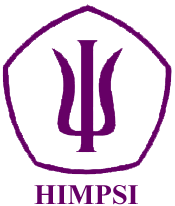Effect of Burnout and Work-Life Balance on Psychological Well-Being in Full-Time Working Women
Abstract
Full Text:
PDFReferences
Angelia, D. (2022, April 29). Partisipasi Kerja Perempuan Tunjukkan Tren yang Positif. GoodStats. Retrieved from https://goodstats.id/article/partisipasi-kerja-perempuan-tunjukkan-tren-yang-positif-VsNkW
Apsaryanthi, N. L. K., & Lestari, M. D. (2017). Perbedaan Tingkat Psychological Well-Being pada Ibu Rumah Tangga dengan Ibu Bekerja di Kabupaten Gianyar. Jurnal Psikologi Udayana, 4(1), 110–118. http://dx.doi.org/10.24843/JPU.2017.v04.i01.p12
Arrogante, O., & Aparicio-Zaldivar, E. G. (2020). Burnout Syndrome in Intensive Care Professionals: Relationships With Health Status and Wellbeing. Enfermería Intensiva (English Ed.), 31(2), 60–70. https://doi.org/10.1016/j.enfie.2019.03.004
Dahlke, A. R., Johnson, J. K., Greenberg, C. C., Love, R., Kreutzer, L., Hewitt, D. B., … Bilimoria, K. Y. (2018). Gender Differences in Utilization of Duty-Hour Regulations, Aspects of Burnout, and Psychological Well-Being Among General Surgery Residents in the United States. Annals of Surgery, 268(2), 204–211. https://doi.org/10.1097/SLA.0000000000002700
Darmawan, A. A. Y. P., Silviandari, I. A., & Susilawati, I. R. (2015). Hubungan Burnout dengan Work-Life Balance pada Dosen Wanita. Jurnal Mediapsi, 1(1), 28–39. https://doi.org/10.21776/ub.mps.2015.001.01.4
Dewi, E. M. P., Irmayanti, S., Nahdah, Amrie, Muh. Y., Hidayat, T., Rismeianti, & Citra, Y. (2023). A Happy Strategy for Dealing with Burnout in Students and Workers: Strategi Jitu Bahagia Menghadapi Burnout pada Kalangan Mahasiswa dan Pekerja. Mattawang: Jurnal Pengabdian Masyarakat, 4(1), 40–47. https://doi.org/10.35877/454RI.mattawang1394
Dewi, R. R., Purwaningrum, E. K., & Mariskha, S. E. (2023). Pengaruh Work-Life Balance terhadap Psychologicall Wellbeing Wanita yang Bekerja. MOTIVASI, 9(1), 53–57.
Dhamija, H., Kakkar, M., Arora, M., Kaur, P., Jagga, S., Singh, S., … Vats, P. (2022). Changing Work Scenario During Pandemic: Burnout Affecting the Psychological Well-Being of College Students. The International Journal of Indian Psychology, 10(4), 41–48. https://doi.org/10.25215/1004.005
Dirfa, Y. N., & Prasetya, B. E. A. (2019). Hubungan Antara Work-Life Balance dengan Psychological Well-Being pada Dosen Wanita di Perguruan Tinggi Salatiga. Jurnal Psikohumanika, 11(2), 151–169. http://dx.doi.org/10.31001/j.psi.v11i2.699
Fisher, G. G., Bulger, C. A., & Smith, C. S. (2009). Beyond Work and Family: A Measure of Work/Nonwork Interference and Enhancement. Journal of Occupational Health Psychology, 14(4), 441–456. https://doi.org/10.1037/a0016737
Issahaku, J., Nkyi, A. K., & Dramanu, B. Y. (2020). Impact of Work Life Balance on the Psychological Wellbeing of Employees in the University of Cape Coast. Journal of Psychology and Behavioral Science, 8(1), 8–19. https://doi.org/10.15640/jpbs.v8n1a1
Lakoy, F. S. (2009). Psychological Well-Being Perempuan Bekerja dengan Status Menikah dan Belum Menikah. Jurnal Psikologi, 7(2), 38–47.
Lockwood, N. R. (2003). Work/Life Balance: Challenges and Solutions.
Alexandria: Society for Human Resource Management.
Maheswari, H., Sofia, E., Kusumawati, F., & Magetsari, M. A. (2021). Kemampuan Hardiness dalam Meminimalisir Dampak Burnout terhadap Psychological Well-Being: Studi Kasus Dosen Universitas Pertamina. Jurnal Sociaperti, 1(1). Retrieved from https://scholar.google.com/scholar?
cluster=12900639641304206285&hl=en&oi=scholarr
Maslach, C., Jackson, S. E., & Leiter, M. P. (1996). Maslach Burnout Inventory (3rd ed.). Palo Alto: Consulting Psychologists Press.
Maslach, C., Schaufeli, W. B., & Leiter, M. P. (2001). Job Burnout. Annual Review of Psychology, 52, 397–422. https://doi.org/10.1146/annurev.psych.52.1.397
Mayangsari, M. D., & Amalia, D. (2018). Keseimbangan Kerja-Kehidupan pada Wanita Karir. Jurnal Ecopsy, 5(1), 43–50. https://doi.org/10.20527/ecopsy.v5i1.4884
Milfont, T. L., Denny, S., Ameratunga, S., Robinson, E., & Merry, S. (2008). Burnout and Wellbeing: Testing the Copenhagen Burnout Inventory in New Zealand Teachers. Social Indicators Research, 89(1), 169–177. https://doi.org/10.1007/s11205-007-9229-9
Mulvi, A. N. A., & Emilisa, N. (2024). Pengaruh Work-Life Balance dan Job Burnout terhadap Intention to Quit dengan Psychological Distress sebagai Varibel Mediasi. Solusi, 22(2), 112–125. https://doi.org/10.26623/slsi.v22i2.8638
Nilakusmawati, D. P. E., & Susilawati, M. (2012). Studi Faktor-Faktor yang Mempengaruhi Wanita Bekerja di Kota Denpasar. PIRAMIDA, 8(1), 26–31.
Persentase Tenaga Kerja Formal Menurut Jenis Kelamin (Persen), 2021-2023. (2024, July 18). Badan Pusat Statistik. Retrieved from https://www.bps.go.id/id/statistics-table/2/MTE3MCMy/persentase-tenaga-kerja-formal-menurut-jenis-kelamin.html
Pudrovska, T., & Karraker, A. (2014). Gender, Job Authority, and Depression. Journal of Health and Social Behavior, 55(4), 424–441. https://doi.org/10.1177/0022146514555223
Rahmi, F. (2021). Peran Work-Life Balance terhadap Psychological Well-Being Pegawai yang Bekerja selama New Normal COVID-19. Jurnal Psikologi, 17(2), 182–190. https://doi.org/10.24014/jp.v17i2.13604
Ramadhani, W. R., Noviekayati, I., & Ananta, A. (2023). Psychological Well-Being Para Perempuan Bekerja: Bagaimana Peran Dukungan Sosial? INNER: Journal of Psychological Research, 2(4), 558–566.
Rehman, A. U., Bhuttah, T. M., & You, X. (2020). Linking Burnout to Psychological Well-Being: The Mediating Role of Social Support and Learning Motivation. Psychology Research and Behavior Management, 13, 545–554. https://doi.org/10.2147/PRBM.S250961
Rosnani, T., Daud, I., Theresa, R., Kalis, M. C. I., & Fahruna, Y. (2023). Determinants and Consequences of Work-Life Balance. Jurnal Ekonomi Bisnis dan Kewirausahaan (JEBIK), 12(2), 222–238. https://doi.org/10.26418/jebik.v12i2.63084
Ryff, C. D. (1995). Psychological Well-Being in Adult Life. Current Directions in Psychological Science, 4(4), 99–104. https://doi.org/10.1111/1467-8721.ep10772395
Ryff, C. D., & Keyes, C. L. M. (1995). The Structure of Psychological Well-Being Revisited. Journal of Personality and Social Psychology, 69(4), 719–727. https://doi.org/10.1037/0022-3514.69.4.719
Ryff, C. D., & Singer, B. H. (2008). Know Thyself and Become What You Are: A Eudaimonic Approach to Psychological Well-Being. Journal of Happiness Studies, 9(1), 13–39. https://doi.org/10.1007/s10902-006-9019-0
Saraswati, K. D. H., & Lie, D. (2020, December 12). Psychological Well-Being: The Impact of Work-Life Balance and Work Pressure. 580–587. Atlantis Press. https://doi.org/10.2991/assehr.k.201209.089
Sari, M. A., & Monalisa, A. (2021). Psychological Well-Being Karyawan Studi Literatur. Syntax Idea, 3(1), 161–170. https://doi.org/10.46799/syntax-idea.v3i1.863
Sari, R. P. N., & Anton, A. (2020). Wanita Karier Perspektif Islam. SANGAJI: Jurnal Pemikiran Syariah dan Hukum, 4(1), 82–115. https://doi.org/10.52266/sangaji.v4i1.446
Satyajati, M. W., Widhianingtanti, L. T., & Adiwena, B. Y. (2020). Psychological Well-Being pada Setting Profesional: Burnout dan Jenis Profesi sebagai Prediktor Psychological Well-Being. Seminar Nasional Psikologi dan Ilmu Humaniora (SENAPIH), 1. Retrieved from https://conference.um.ac.id/index.php/psi/article/view/24
Setio, A. K. (2024). Pengaruh Work-Family Balance terhadap Psychological Well-Being pada Mompreneur dengan Family Support sebagai Variabel Moderator. Bulet Riset Psikologi dan Kesehatan Mental (BRPKM), 1–14.
Siddiqui, H., Sharif, F., Ahmed, A., & Akbar, W. (2021). Mediating Role of Burnout Between the Job Demands-Control Model and Psychological Well-Being in Healthcare Professionals in Pakistan. Makara Human Behavior Studies in Asia, 25(1), 116–126. https://doi.org/10.7454/hubs.asia.2120220
Sinha, S. (2017). Multiple Roles of Working Women and Psychological Well-Being. Industrial Psychiatry Journal, 26(2), 171. https://doi.org/10.4103/ipj.ipj_70_16
Tasnim, M., Hossain, M. Z., & Enam, F. (2017). Work-Life Balance: Reality Check for the Working Women of Bangladesh. Journal of Human Resource and Sustainability Studies, 5(1), 75–86. https://doi.org/10.4236/jhrss.2017.51008
Thakre, N., & Kawde, A. (2021). Organizational Role Stress, Burnout and Psychological Wellbeing among Employees. Journal of Psychosocial Research, 16(2), 405–415. https://doi.org/10.32381/JPR.2021.16.02.20
Yudiani, E., & Istiningtyas, L. (2022). Psychological Well-Being and Work-Life Balance for Woman Lecturers. Psikis: Jurnal Psikologi Islami, 8(1), 19–30. https://doi.org/10.19109/psikis.v8i1.6657
Załuski, M., & Makara-Studzińska, M. (2022). Latent Occupational Burnout Profiles of Working Women. International Journal of Environmental Research and Public Health, 19(11), 6525. https://doi.org/10.3390/ijerph19116525
DOI: http://dx.doi.org/10.17977/um023v13i22024p%25p
Refbacks
- There are currently no refbacks.
Copyright (c) 2024 Jurnal Sains Psikologi

This work is licensed under a Creative Commons Attribution 4.0 International License.
Reference Manager :
|
Aliansi:
Plagiarism Checker :
This work is licensed under a Creative Commons Attribution 4.0 International License.



1.png)








